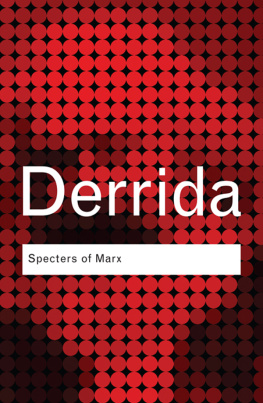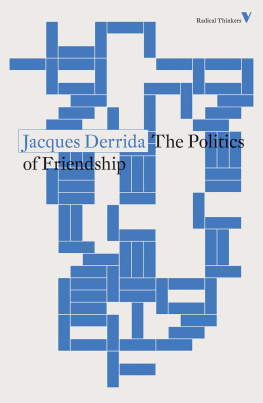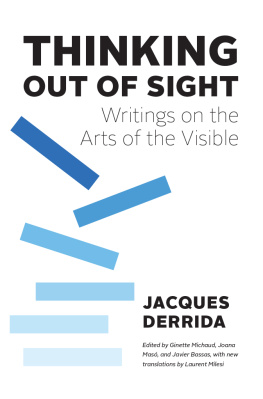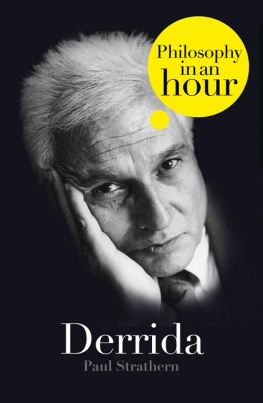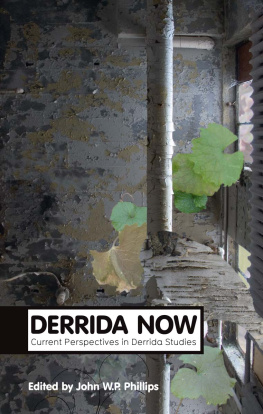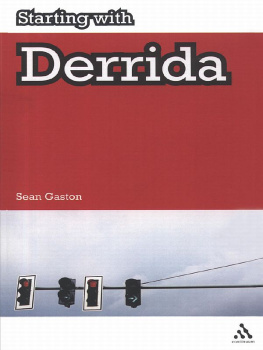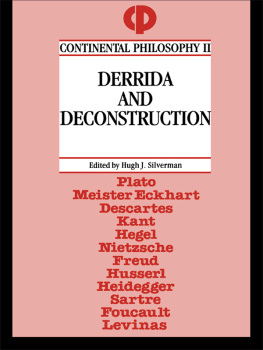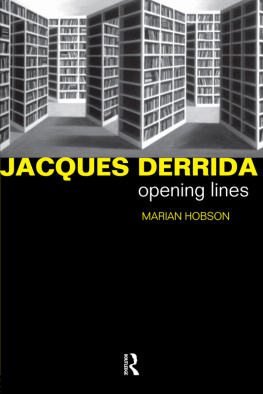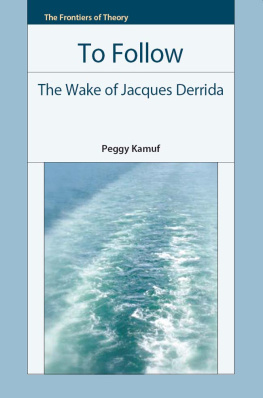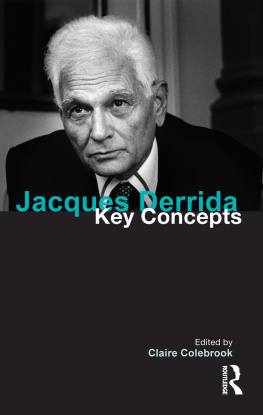Jacques Derrida - Learning to Live Finally
Here you can read online Jacques Derrida - Learning to Live Finally full text of the book (entire story) in english for free. Download pdf and epub, get meaning, cover and reviews about this ebook. year: 2010, publisher: Melville House, genre: Politics. Description of the work, (preface) as well as reviews are available. Best literature library LitArk.com created for fans of good reading and offers a wide selection of genres:
Romance novel
Science fiction
Adventure
Detective
Science
History
Home and family
Prose
Art
Politics
Computer
Non-fiction
Religion
Business
Children
Humor
Choose a favorite category and find really read worthwhile books. Enjoy immersion in the world of imagination, feel the emotions of the characters or learn something new for yourself, make an fascinating discovery.

- Book:Learning to Live Finally
- Author:
- Publisher:Melville House
- Genre:
- Year:2010
- Rating:5 / 5
- Favourites:Add to favourites
- Your mark:
- 100
- 1
- 2
- 3
- 4
- 5
Learning to Live Finally: summary, description and annotation
We offer to read an annotation, description, summary or preface (depends on what the author of the book "Learning to Live Finally" wrote himself). If you haven't found the necessary information about the book — write in the comments, we will try to find it.
Learning to Live Finally — read online for free the complete book (whole text) full work
Below is the text of the book, divided by pages. System saving the place of the last page read, allows you to conveniently read the book "Learning to Live Finally" online for free, without having to search again every time where you left off. Put a bookmark, and you can go to the page where you finished reading at any time.
Font size:
Interval:
Bookmark:
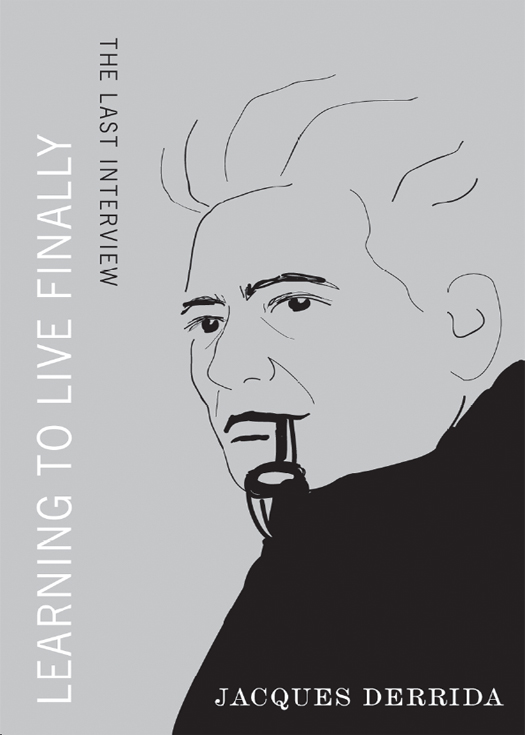
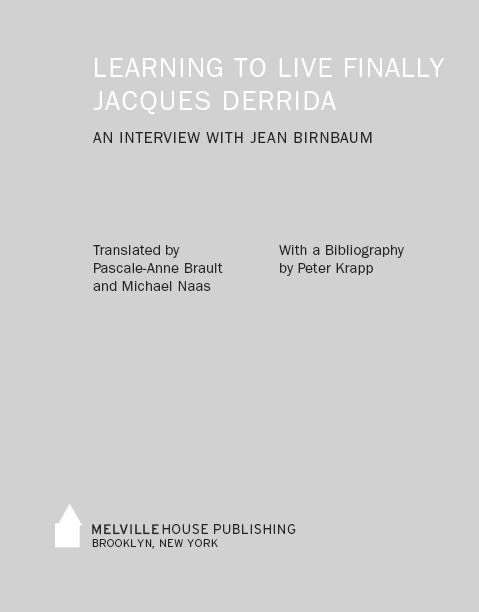
TRANSLATION 2007
MELVILLE HOUSE PUBLISHING
FIRST PUBLISHED AS
APPRENDRE VIVRE ENFIN:
ENTRETIEN AVEC JEAN BIRNBAUM
BY DITIONS GALILE/LE MONDE.
MELVILLE HOUSE PUBLISHING
145 PLYMOUTH ST.
BROOKLYN, NY 11201
WWW.MHPBOOKS.COM
eISBN: 978-1-61219-032-7
v3.1
INTRODUCTION
BY JEAN BIRNBAUM
THE LAST INTERVIEW
NOTES
TRANSLATORS NOTE
SELECTED BIBLIOGRAPHY
BY PETER KRAPP
INTRODUCTION
BEARING LOSS:
DERRIDA AS A CHILD
BY JEAN BIRNBAUM
On August 19, 2004 the French newspaper Le Monde published an interview with Jacques Derrida. In that interview, which appeared under the title I am at war with myself, the philosopher appeared on a scene that was familiar to him, that of a mourning at once originary and incessantly to come, and whose imminence now seemed to color his every gesture. On this scene or stage Derrida had chosen to come forward, this time more than ever, as a survivor. That is, as both an uneducable specter who will have never learned how to live and a man who does not want to stop saying yes to life, a thinker whose entire work pays homage to the subversive intensity of existence.
A few weeks after the publication of this interview, during the night of October 9th, Derrida succumbed to his illness. For those who had read and loved him, and who were ready to accompany him further, for a long time still and always in the present, it wasnt easy to find the strength. At the moment the curtain fell, one felt, almost instinctively, that it was best not to move: better just to stay there by his side, on that inexorable stage of mourning where we would have to bid him farewell [salut].
Not to disappear from the scene, then, not to leave the stage. If I may thus be forgiven an apparent aside, I would like to recall here the name of Imre Kertesz and thank the theater company of the Thtre Ouvert in Paris, where his Kaddish for a Child Not Born was adapted for the stage and performed.a man already half in the grave, what was inaugurated was indeed something like a cogito of survival: I survived therefore I am. Everything is there if you listen carefully, everything returns in the form of some Derridean theme: I was able to survive, or simply to be and exist, only in secret, confides the narrator of this strange Kaddish.
There would be much to say about these moments when the spectral writing of Kertesz seems inhabited, indeed literally ventriloquized, by the spirits (for there are more than one) of Derrida. Let me simply mark this double uncertainty, the double aporia with which the Hungarian author struggles: it is impossible, from childhood on, to know what it is to be Jewishthats the original problem of identity; and it is also impossible to acquire, in the proper sense of the term, any kind of savoir-vivre, any kind of knowing how to live. No way to learn to live [apprendre vivre], to take up the expression Kertesz uses repeatedly, never without italics, to describe the absolute solitude of his character, a former prisoner of the concentration camps, now a writer whose wife has left him: She repeated more than once that it was from me that she
Thats it for the end; now lets return to the beginning. A few months before this coup de thtre, I went to the home of Jacques Derrida. It was the spring of 2004; the terrible illness was there but the hour of the Kaddish seemed far away. No one, at least, could really imagine it. After many hesitations, at the moment of beginning our conversation, of posing a first question, it was almost exactly the same words, the same italics, that imposed themselves upon us: Someone, you or me, comes forward and says: I would like to learn to live finally. Everything began there, everything being contained there in reserve, in this enigmatic formula that gave the interview its initial impetus and its momentum.
That the philosopher himself wished to confer upon his responses a sort of testamentary charge was clear from the outset. To rediscover them today, in light of the Kaddish, is to confront the affirmation and hope that are displayed there, no matter the cost, one line after another: the lucid affirmation
This archive desire, this essential concern for generations, haunts the entire Derridean landscape. From out of this landscape two figures emerge, those of the ghost and of the childthe only witnesses at the end. To follow the traces they leave behind, let us return briefly to the two aporias of Imre Kerteszs Kaddish.
First, Jewishness: a lost child of Judaism, Derrida often recalled the double movement of acquiescence and anxiety, of love and revolt, that characterized his relationship to the tradition of Israel. Evoking in this regard the obscure and uncertain experience of inheritance, he underscored the violence of an assignation of identity inscribed from the outset in
And then: learning to live. As with Jewishness, we would have to cite text after text on this point, so much is Derridas reflection obsessed by this second aporia, this other way of naming the impossible: To live, by definition, is not something one learns. Not from oneself, it is not learned from life, taught by life. Only from the other and by death.
Such is the burning vocation of the survivor, this apprentice ghost who never looks backward without falling back into childhood: survival structures every instant in a kind of irreducible torsion, that of a retrospective anticipation that introduces the untimely moment and the posthumous into what is most living in the living present, the rearview mirror of an expecting-death at every moment, writes Jacques Derrida.
A few days before the publication of our interview (which here appears in its entirety and as Derrida himself had approved it), the philosopher was seated at a table at his home in Ris-Orangis. Pen in hand, he reread the contents of the interview with great care, with the studious concentration of someone who always wanted to present himself as a schoolboy. Wherever a particular formulation had been edited out, we would be certain to be reproached: Do you realize the vertiginous questions contained in these words? His eyes were full of a gentle anger, simple, almost innocent. And he would try to catch the eye, to gain the support, of his wife, Marguerite, without whom nothing would have been possible.
In this text, Derrida had wanted to speak of his illness. Did he sense that it would be for both the first and last time? One might think so, given how painful each deletion was to him. Time was running out on all sides: he was expected that afternoon in Brazil, where an international conference was being held in his honor. His suitcases still open, he took a moment to sit down and heave a sigh: One thing is certain, people are going to read this and think Im just barely surviving, that I am already dead. We took these words at the time as a sort of provocation from an enfant terrible. No one close to him could really believe it.
JEAN BIRNBAUM
LEARNING TO LIVE FINALLY
THE LAST INTERVIEW
JEAN BIRNBAUM : Since summer 2003 youve never been more visible on the public scene. You have not only published many new works but have traveled around the world to participate in several international conferences organized around your workin London, in Coimbra, here in Paris, and, in the coming days, in Rio de Janeiro. A second film has been made about you (
Font size:
Interval:
Bookmark:
Similar books «Learning to Live Finally»
Look at similar books to Learning to Live Finally. We have selected literature similar in name and meaning in the hope of providing readers with more options to find new, interesting, not yet read works.
Discussion, reviews of the book Learning to Live Finally and just readers' own opinions. Leave your comments, write what you think about the work, its meaning or the main characters. Specify what exactly you liked and what you didn't like, and why you think so.



